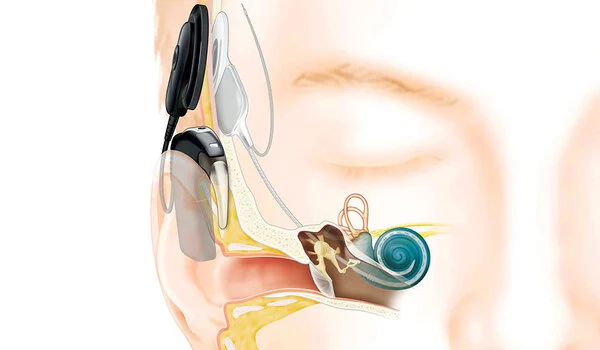A new study in deaf rats shows that stimulating the brain’s natural ability to adapt to new circumstances, known as neuroplasticity, improves the effectiveness of a cochlear implant in restoring hearing loss. According to the researchers, the study could help explain the wide range of hearing improvements experienced by implant recipients.
Unlike hearing aids, which amplify, balance, and sharpen incoming sounds, cochlear implants send electrical signals to the brain that represent sounds. Unfortunately, experts say that understanding the meaning of the signals can take time. Previous research found that while some cochlear implant users understood some speech hours after receiving their device, others took months or years. However, the mechanisms that govern how quickly the brain adjusts to an implant have remained unknown.
The new study in rats, led by researchers at NYU Langone Health, examined whether stimulating the locus coeruleus, a major site of neuroplasticity deep in the brainstem of mammals, improved how quickly they learned to use their devices. It demonstrated that rodents given the extra boost could effectively complete tasks requiring accurate hearing within three days of receiving their implants. Those who did not receive stimulation took up to 16 days to recover.
Our findings suggest that improving neuroplasticity in the locus coeruleus may accelerate and improve the efficacy of cochlear implants. Our findings suggest that differences in neuroplasticity, particularly in parts of the brain such as the locus coeruleus, may help explain why some cochlear implant users improve faster than others.
Robert Froemke
“Our findings suggest that differences in neuroplasticity, particularly in parts of the brain such as the locus coeruleus, may help explain why some cochlear implant users improve faster than others,” says study lead author and neuroscientist Erin Glennon, Ph.D., a medical student at NYU Grossman School of Medicine.
Previously, the researchers discovered that electrically stimulating the locus coeruleus in rodents increases neuroplasticity and changes how the brain’s hearing system represents a sound. According to Glennon, the new study, published online in the journal Nature, is the first to show that stimulating this brain region improves hearing in cochlear implant recipients.
The researchers trained normal-hearing rats to press a button after hearing a specific sound and to ignore the button if they heard a different tone. The rats were unable to complete the task after being deafened. They were then fitted with cochlear implants and retrained to complete the same task while relying on the device.

The study discovered, among other things, that locus coeruleus activity changed dramatically as the rats learned to use their implants. When the animals received food after hearing the tone and pressing the correct button, the brain region was most active at first. As they became accustomed to associating pressing the button with receiving the reward, activity increased when they simply heard the tones. Notably, the rats consistently succeeded at the task faster when this change occurred.
“Our findings suggest that improving neuroplasticity in the locus coeruleus may accelerate and improve the efficacy of cochlear implants,” says study co-senior author and neuroscientist Robert Froemke, Ph.D., the Skirball Foundation Professor of Genetics in the Department of Neuroscience and Physiology at NYU Langone.
Froemke says the team next plans to explore ways of stimulating the brain region in humans that do not require invasive surgery. Froemke also serves as a professor in the Department of Otolaryngology-Head and Neck Surgery at NYU Langone.
“Because our goal is to activate the locus coeruleus, we need to figure out what noninvasive mechanisms can be used to trigger the brain region,” says Mario Svirsky, Ph.D., study co-senior author. Svirsky is the Noel L. Cohen Professor of Hearing Science in NYU Langone’s Department of Otolaryngology—Head and Neck Surgery.
Svirsky, a professor in the Department of Neuroscience and Physiology at NYU Langone, cautions that the rats’ hearing was tested using simple sounds in a simple task, whereas humans must respond to nuanced speech patterns in noisy environments. He believes that more research into other brain regions that may be involved is required.















